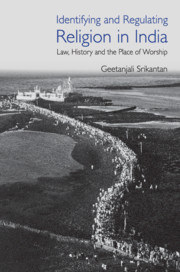Book contents
- Frontmatter
- Contents
- Acknowledgements
- Introduction
- 1 Secularisation and Theologisation: The Making of ‘Hindu Law’ and British Colonialism
- 2 The Role of Legal Hermeneutics as Secularisation in the Formation of Anglo-Muhammadan Law
- 3 Influences and Confluences: The Theological Foundations of Western Property Law and the Place of Worship in India
- 4 Identifying ‘Doctrine’: Tracing Theologisation in Legal Narratives of the Place of Worship in India
- 5 Rethinking Definitions: Hinduism as Religion in the Indian Supreme Court
- Conclusion
- Glossary
- List of Cases
- Bibliography
- Index
5 - Rethinking Definitions: Hinduism as Religion in the Indian Supreme Court
Published online by Cambridge University Press: 30 April 2020
- Frontmatter
- Contents
- Acknowledgements
- Introduction
- 1 Secularisation and Theologisation: The Making of ‘Hindu Law’ and British Colonialism
- 2 The Role of Legal Hermeneutics as Secularisation in the Formation of Anglo-Muhammadan Law
- 3 Influences and Confluences: The Theological Foundations of Western Property Law and the Place of Worship in India
- 4 Identifying ‘Doctrine’: Tracing Theologisation in Legal Narratives of the Place of Worship in India
- 5 Rethinking Definitions: Hinduism as Religion in the Indian Supreme Court
- Conclusion
- Glossary
- List of Cases
- Bibliography
- Index
Summary
Introduction: Revisiting the Essential Practices Test and the Legal Definition of Hinduism
In an extraordinary portrayal of the complexities in the legal definition of religion, Winnifred Sullivan analyses the trial around the placing of decorations on graves situated on public land in the city of Boca Raton in Florida. In this trial, the court had to judge whether vertical markers placed by the plaintiffs in violation of the city's cemetery regulations were an exercise of religion under the Florida Religious Freedom and Restoration Act of 1998 (FRFA). In order to decide whether such a practice fell within a religious tradition, the court had to consider whether such a practice is asserted by an authoritative sacred text, is affirmed in doctrine and practice, and was observed continuously until contemporary times. If this practice did not meet any of the criteria specified, it would be considered a matter of personal preference. It was found by the court that the way in which such markers and religious symbols were displayed vertically or horizontally amounted to a matter of purely personal preference.
Analysing this decision, Sullivan argues that ‘there is no accepted legal way of talking in the United States about the vast array of religious beliefs and practices that are represented’ (Sullivan 2005: 100). The navigation of the legal definition of religion determined by the requirements of the FRFA necessitated an oscillation between the plaintiffs’ efforts to show their conduct was religiously motivated and the city's emphasis on institutional and textual sanction. Provocatively, Sullivan argues for the inherent impossibility of religious freedom and the removal of the protection of religious freedom as a special category. She argues that the free exercise clause in the US Constitution is inherently unworkable as there is no political consensus on how religion should be privileged in law due the incapacity of law to define religion (ibid.: 150).
Litigants contesting religious claims in Indian courts would find common ground with their American counterparts that there is no consensus on the definition of religion. They would also concur that their efforts to navigate textual and normative conceptualisations of the law in order to receive protection for their religious beliefs and practices in law are often futile.
- Type
- Chapter
- Information
- Identifying and Regulating Religion in IndiaLaw, History and the Place of Worship, pp. 176 - 205Publisher: Cambridge University PressPrint publication year: 2020



